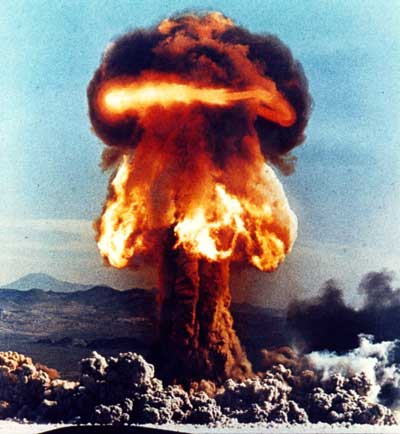
We don’t want a weapons of mass destruction summer
By Terri Lodge, Mary Kaszynski, and Derek Bolton
In a time-honored t radition: all of exhausted Washington, D.C. is packing up for the summer and heading out to less intense venues. Congress will not to be heard in Washington until late September, when regular sessions resume. With elections looming, campaigns are in full swing. There will likely be no major policy moves from the White House. It’s nice time to visit your favorite restaurant and play tourist in the Capitol. We all hope to forget about D.C. for a while, though our handheld devices will still be nearby.
radition: all of exhausted Washington, D.C. is packing up for the summer and heading out to less intense venues. Congress will not to be heard in Washington until late September, when regular sessions resume. With elections looming, campaigns are in full swing. There will likely be no major policy moves from the White House. It’s nice time to visit your favorite restaurant and play tourist in the Capitol. We all hope to forget about D.C. for a while, though our handheld devices will still be nearby.
Sounds nice….unless the world comes calling.
The anniversary of the bombing of Hiroshima reminds us of the devastating consequences of weapons of mass destruction. Hiroshima was 67 years ago, but the risks of a WMD disaster are still present today. There are many simmering crises involving the most dreaded weapons.
Syria’s Chemical Weapons
The increasing fragility of the Assad regime has raised concerns about Syria’s stockpile chemical and biological weapons. With several hundred tons of blistering agents, large quantities of nerve agents, possibly including VX, and four known chemical weapon production facilities, Syria’s chemical weapons program may be the largest in the world. On top of that,
Syria’s WMD capabilities have long been assumed, but were only recently confirmed in an announcement by the Syrian Foreign Ministry. “No chemical or biological weapons will ever be used, and I repeat, will never be used, during the crisis in Syria no matter what the developments inside Syria,” the spokesman said. Any relief these words might have caused was erased by his next words: “[These weapons] will never be used unless Syria is exposed to external aggression.”
The use of chemical or biological weapons would be disastrous. But that’s not the only concern. Securing Syria’s WMD arsenal in the event of the regime’s fall would be a daunting task that could require 75,000 troops.
Iran’s Nuclear Program
The latest round of talks between EU and Iran officials failed to solve the nuclear standoff. Iran continues to increase its enrichment activities. The U.S. and Iran increased their military capabilities in the Gulf. All of these factors have combined to make a military conflict more likely.
Congress is addressing the Iran dilemma by imposing harsher and harsher sanctions. But whether this is the best solution is still unclear. If policymakers lose sight of the goal – a long-term agreement on Iran’s nuclear program – the situation could spiral out of control.
North Korea’s Nuclear Weapons
North Korea remains the ever present wild card in the nuclear realm. By moving toward a third nuclear weapons test at the end of May – only to be pulled back by China – the North reminded the world of its nuclear capability. Unfortunately for the North, the failed launch of the Unha-3 in April also reminded the world of its wanting ballistic missile program.
Both actions came in the wake of what many saw as a promising sign from the new DPRK leader, Kim Jong Un: the North agreed to a halt uranium enrichment and nuclear weapons tests in exchange for U.S. food aid. However, the U.S. pulled out of the agreement after the failed missile test and North Korea has since pledged to press on with its nuclear program.
For the time North Korea appears to be preoccupied with internal domestic strife. Kim Jong Un, already preoccupied with solidifying his power over the army and forming a new brand image for his leadership, has also had to contend with mother nature. Recent droughts, and now the onset of floods, have left 109 dead, tens of thousands of homeless, and dealt a serious blow to the country’s already weak agriculture sector.
While this could make the North more complacent as it seek out international aid, there is little sign the North has any intention of seriously sacrificing its ongoing nuclear endeavors.
Preventing a WMD disaster this summer
Solving these security dilemmas will not be easy. Avoiding a WMD disaster will require creative thinking, confidence-building measures, and a commitment to engagement. It will also require leadership from Congress and the administration – leadership and the courage to reach across party lines, even in an election year, to address the national security issues that threaten the U.S. and the entire world.
A WMD disaster would ruin more than just our summer plans. As partisan squabbling and election year rhetoric heat up, let’s remember that there are serious threats out there that require our undivided – and non-partisan – attention.





